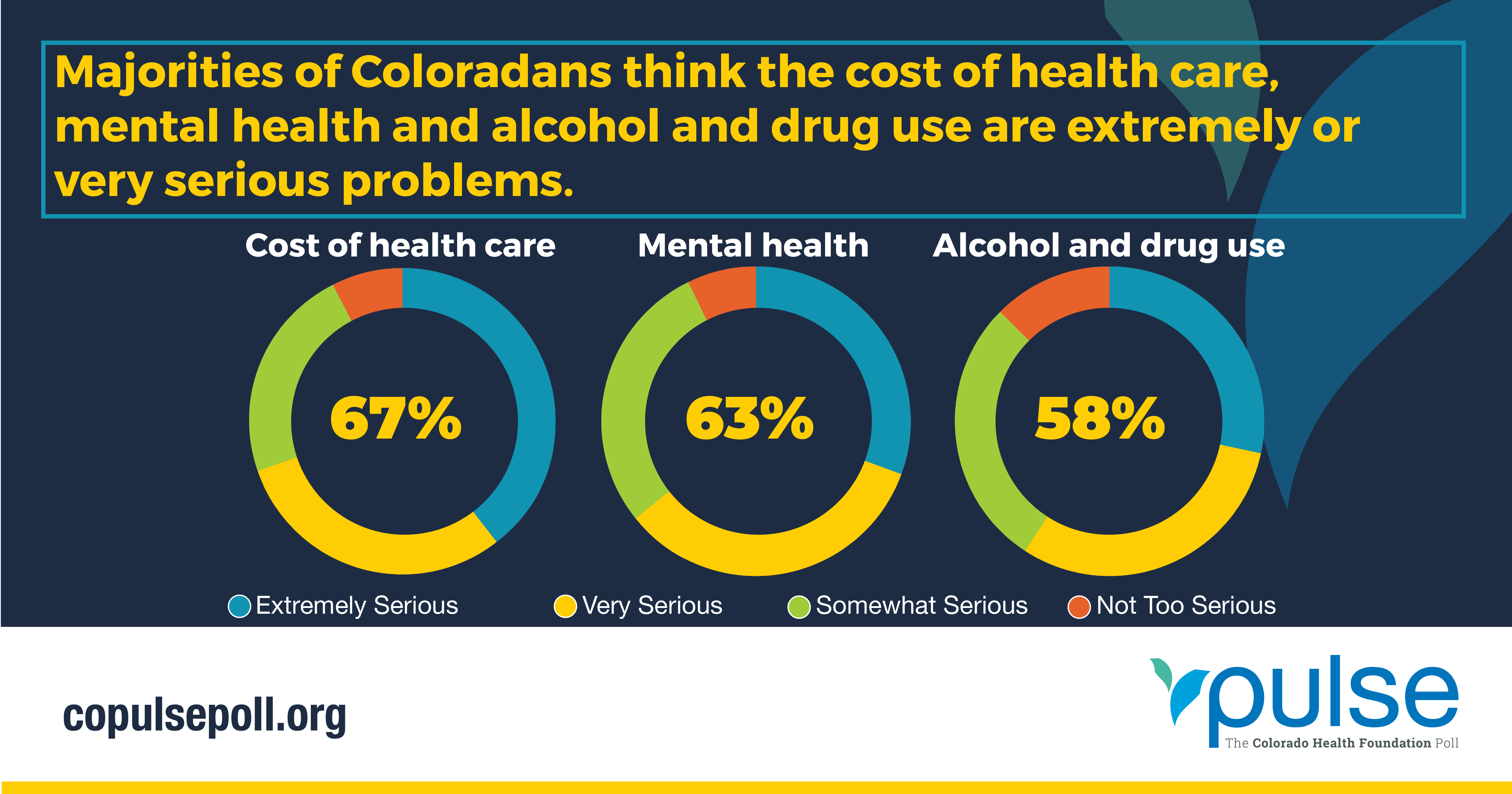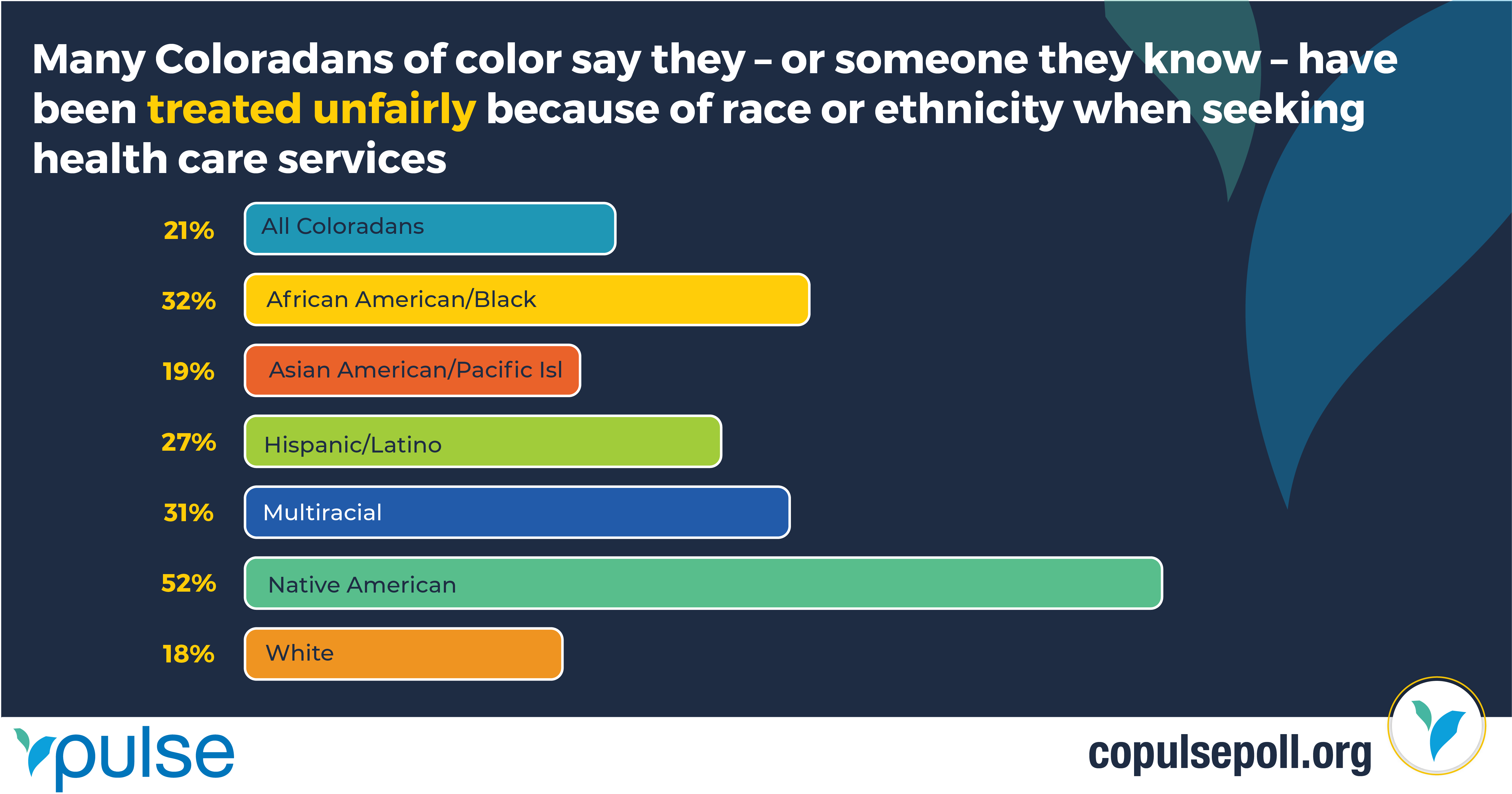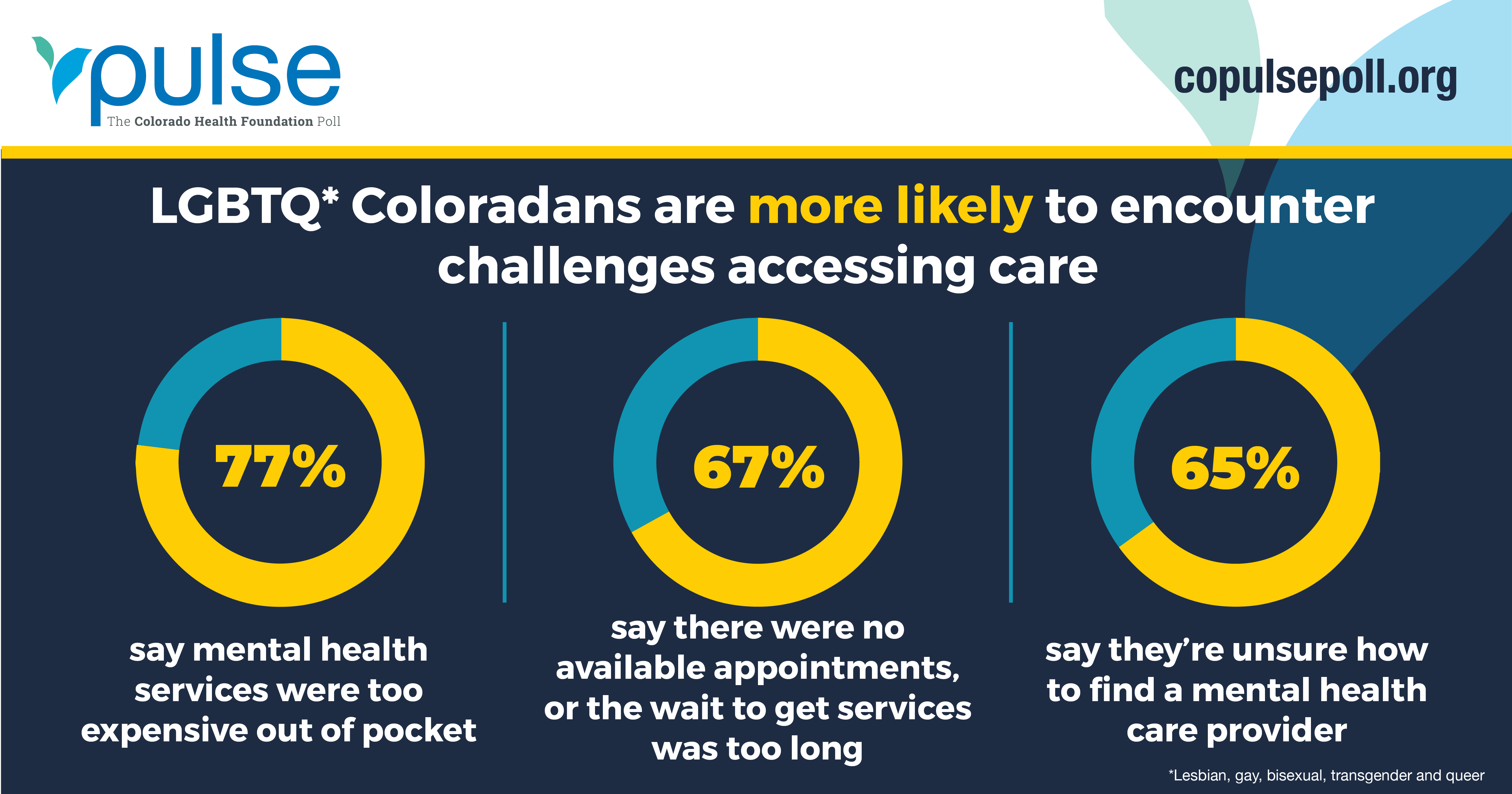Press Contacts:
For interview opportunities with members of The Colorado Health Foundation, the research team and/or representatives from partner organizations and Colorado residents directly impacted by the topics covered in the 2022 Pulse Poll, please contact:
Marty Schechter, marty@schechterpr.com, (303) 882-4585
Austin Montoya, amontoya@coloradohealth.org, 303-953-3686
DENVER, COLORADO – Concerns about COVID-19 may have moved to the background, but challenges to the health and well-being of Coloradans haven’t disappeared. According to The Colorado Health Foundation’s Pulse Poll of nearly 3,000 Coloradans, nearly half (45%) of all Coloradans have postponed medical or dental care in the last year, and almost four-in-10 (37%) Colorado residents are worried that they or someone in their household will be without health insurance in the next year. Six in 10 Coloradans have experienced mental health strain such as anxiety, depression, loneliness or stress, and significant percentages report challenges in accessing mental health care, including the cost of services, availability of appointments and uncertainty in how to find providers. Coloradans are experiencing these challenges to health and well-being on top of the increasing economic pressures felt by residents in every part of the state.
“This year’s results are a siren going off, alerting us to trouble that has real impacts on the health and well-being of Coloradans,” said Colorado Health Foundation Senior Director of Policy Advocacy, Kyle Rojas Legleiter. “The cost of health care remains a problem for a majority of people in our state; the mental health strains that may have been amplified by COVID-19 continue; and alcohol and drug use is an increasing issue across the state. We need to work together to find solutions to these challenges so that everyone in Colorado has what they need to keep good health within reach.”
When asked to rank a series of problems facing Colorado, respondents place concerns related to health and well-being second to the increasing cost of living and housing. Health care costs, mental health and drug and alcohol use are all seen as extremely or very serious problems by 67%, 63% and 58% of respondents respectively.
- Health care costs and mental health have been consistent concerns for Coloradans with about two-thirds naming it as a top problem in 2021 and 2022.
- Concern about alcohol and drug use is increasing; in 2020, 45% of Coloradans considered it a serious problem; in 2021, it was 50%, and in 2022, a majority of respondents (58%) now say it’s a problem.

Many Coloradans are worried about losing access to care – and care is already out of reach for some.
About two-thirds of Coloradans say the cost of health care is a problem, but cost isn’t the only challenge facing respondents. Almost four-in-10 (37%) Colorado residents are worried that they or someone in their household will be without health insurance – up from 27% in 2021.
- A majority (56%) of people with Medicaid are worried about losing their insurance, and more than three-in-four (76%) uninsured Coloradans are worried they’ll remain without it.
- Immigrants and those who speak a language other than English at home are more likely to be worried about losing health insurance at 49% and 45% respectively.
“The cost of health care was a serious concern for Coloradans before the pandemic and recent inflation, but those costs are having more severe impacts on Coloradans’ lives,” said Dave Metz, Democratic pollster for Pulse and president of FM3 Research. “The proportion of Coloradans who have postponed medical or dental care in the last year is up sharply – to nearly half of all residents of the state – and more are now worried that they or their loved ones will have to go without insurance coverage in the next year. At a moment when we still face critical health care risks from the pandemic, more and more Coloradans worry that they could lose access to the care they need.”
Almost half (48%) of people of color are worried about not having insurance in the next year, but that’s not the only worry they’re carrying. Many Coloradans of color say they – or someone they know – have been treated unfairly because of their race or ethnicity when seeking health care services: 52% of Native Americans, 32% of African American respondents, 31% of multiracial Coloradans, 27% of Latinos and 19% of Asian Americans and Pacific Islanders (compared to 18% of White people). About one-in-five (21%) of all respondents say they – or someone they know – were treated unfairly because of race or ethnicity when seeking health care.

In 2022, 45% of Coloradans say they’ve postponed medical or dental care in the last 12 months – an increase from 38% in 2021. There are many experiences associated with postponing care:
- Lack of insurance: 65% of uninsured Coloradans and 64% of those who are worried about not having insurance postponed care.
- Financial instability: 78% of people who skipped meals because they couldn’t afford food also postponed medical or dental care.
- Fear of racial bias: 65% of those who experienced or know someone who has experienced unfair treatment when seeking health care postponed medical or dental care.
Mental health strain remains for a majority of Coloradans, and finding help is often challenging.
In 2020, a majority (53%) of Pulse respondents said they had experienced increased mental health strain in the last year. Now two years later, schools and businesses are open, vaccines are readily available and the economy is growing again – but mental health strain remains. In 2022, 61% of Coloradans say they have experienced mental health strain such as anxiety, depression, loneliness or stress in the last year.
Mental health strain is not impacting all Colorado residents equally:
- Financial insecurity often exists alongside mental health strain: 72% of those living on low income are experiencing it.
- Unfair treatment because of race and ethnicity has lasting impacts: 74% of those who were treated unfairly in health care settings say they’re experiencing mental health strain.
- Working and taking care of kids can be stressful: 66% of people who are employed full time and 65% of parents are experiencing mental health strain.
Even when Coloradans are trying to find help, there are many challenges to accessing mental health care, according to respondents who are experiencing emotional strain like anxiety and depression. The challenges include:
- Expensive, out-of-pocket costs: 66% of all Coloradans and 77% of uninsured people say out-of-pocket costs were a challenge.
- Inability to find appointments: 57% of all Coloradans and 66% of young people aged 18-29 say there were no available appointments or the wait for help was too long.
- Difficulty finding a mental health provider: 50% of all Coloradans and 68% of Asian Americans and Pacific Islanders say they were unsure how to find a provider.
- Lack of providers who understand Coloradans’ experiences: 50% of all Coloradans, 59% of people with disabilities, and 62% of lesbian, gay, bisexual, transgender and queer (LGBTQ) people say it was a challenge to find a mental health provider who would be understanding of their background or experiences.
- Concerns about privacy: 42% of all Coloradans, 51% of people who speak a language other than English at home and 63% of Eastern Plains residents say they were concerned about having to disclose personal information.
- Fear of judgment: 38% of all Coloradans, 52% of Asian Americans, 50% of Black respondents, 50% of multiracial people and 49% of Latinos say they had concerns about being judged by family members, friends or coworkers.
LGBTQ Coloradans are among the most likely to experience mental health strain and to report facing challenges accessing mental health care.

"We have heard the alarm about children's mental health, as evidenced by previous surveys, but we are also seeing a real problem among adult Coloradans, with the vast majority indicating that they are under real mental strain,” said Lori Weigel, Republican pollster for Pulse and principal of New Bridge Strategy. “At the same time, many report significant barriers in accessing mental health care and increasing worries about having health care coverage. People are telling us they are sitting on top of a fault line, and any shift may mean more and more of them fall through the cracks."
More Coloradans think alcohol and drug use is a problem in the state.
Coloradans are more and more concerned about alcohol and drug use; since 2020, there’s been a 13% increase in the number of people saying it’s an extremely or very serious problem. More than 1-in-10 (13%) respondents say that the amount of alcohol or drugs they consume has increased in the past year, and 13% also say they’ve felt worried about the amount of alcohol or drugs they consume. Among those who have increased their use, 44% feel worried about it.
- About one-quarter of LGBTQ Coloradans have increased their consumption (24%) and are worried about how much they use (25%).
- One-in-five young people (20%) have increased the amount of alcohol and drugs they consume and are worried about how much.
- Mental health strain can sometimes co-exist with alcohol and drug use: 17% of those with mental health strain say they’ve increased how much alcohol or drugs they consume.
Coloradans view policy changes as effective tools to improve mental health and decrease alcohol and drug use.
A majority of Republican, Independent and Democratic respondents believe the following actions would offer effective solutions for improving mental health in Colorado:
- Creating more options for people to access mental health care where they live (85%).
- Republican 79%, Independent 87%, Democrat 92%
- Requiring health insurance companies to cover more mental health services without requiring copays (80%).
- Republican 73%, Independent 81%, Democrat 92%
- Pairing mental health professionals with law enforcement to respond to mental health emergency calls (77%).
- Republican 62%, Independent 79%, Democrat 92%
When it comes to the most effective actions that could address increasing rates of alcohol and drug use, Coloradans demonstrate enthusiasm for:
- Making treatment for addiction more affordable and more easily available (81%).
- Republican 75%, Independent 84%, Democrat 89%
- Connecting people trying to recover from addiction with support from other people like them (81%).
- Republican 77%, Independent 82%, Democrat 86%
- Investing in programs to prevent people from abusing alcohol and drugs (68%).
- Republican 59%, Independent 71%, Democrat 74%
- Sending people to treatment, not to jails or prisons, if they’ve committed a crime related to alcohol or drug use (67%).
- Republican 46%, Independent 70%, Democrat 85%
Register for Pulse briefings
This year, the Colorado Health Foundation is releasing findings from its statewide poll in phases, providing a variety of options for people to engage with the data that interests them most. The current phase focuses on the perspectives of Coloradans on health care, mental health and alcohol and drug use. A previous phase highlighted findings related to the cost of living and housing. The final phase in mid-June will provide a deep-dive into all the challenges that impact Coloradans most and the solutions they’d like to see prioritized.
There’s still time to register for our briefing on Health and Well-being. REGISTER NOW for this event on June 8, 11 a.m. – 12 p.m.
Also, consider registering for this final Pulse Poll 2022 briefing:
- Pulse Briefing #3, Deep Dive on Critical Themes from the Survey: Wednesday, June 22, 10 - 11:30 a.m.
To register for a Spanish-only briefing, click here.
Each briefing will share detailed data about the challenges that Coloradans are facing, the impact of those challenges and the types of solutions that people want to see prioritized by policymakers.
Resources available for download
The Colorado Health Foundation is committed to transparency, including access to the full results of Pulse. These resources are available in both English and Spanish and include:
- Questionnaire with topline results (English | Spanish)
- Cross-tabs with data on how different sub-groups answered each question (English | Spanish)
- Presentation deck with easy-to-read charts and graphs (English | Spanish coming soon)
About Pulse
At The Colorado Health Foundation, we believe in the importance of listening, and that’s why each year we listen to Coloradans from across the state through our annual poll. From the increasing cost of living and lack of affordable housing, to health care and mental well-being, our poll takes the pulse of Coloradans on a range of important issues this year and every year – to inform policy that advances health equity. For more information, visit www.copulsepoll.org.
The 2022 Pulse Poll was conducted by telephone and online from April 5-26, 2022 among a random representative sample of 2,985 adults age 18 and older living in Colorado. The margin of sampling error for the full sample is +/-2.2% at the 95% confidence interval. For results based on sub-groups, the margin of sampling error is higher.
About The Colorado Health Foundation
The Colorado Health Foundation is a nonprofit, nonpartisan organization bringing health in reach for all Coloradans by engaging closely with communities across the state through investing, policy advocacy and research. For more information, visit www.coloradohealth.org.
# # #
